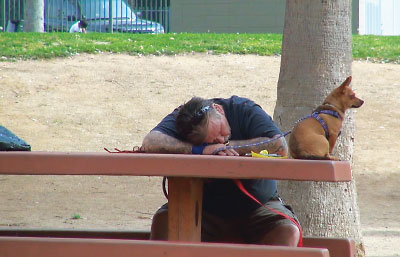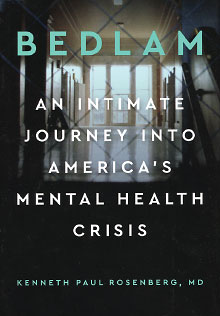Film Documents History of Deinstitutionalization and Its Impact on Today’s SMI Population
Abstract
A sizable portion of the IPS audience viewing a segment of “Bedlam” consisted of young psychiatrists, for whom the documentary was both a history lesson and rallying cry for change.
“There’s a lot of people down here suffering from mental [illness], and that’s why they’re down there [on the street]. … I suffer from it and these people suffer from it, and there ain’t no help nowhere. …”
That’s Todd speaking, one of Los Angeles County’s more than 53,000 homeless men and women, in an interview with psychiatrist Kenneth Rosenberg, M.D. The interview is part of Rosenberg’s disturbing documentary “Bedlam: An Intimate Journey Into America’s Mental Health Crisis,” scheduled to air on PBS’s “Independent Lens” in April 2020.

Todd, whose story is featured in the film “Bedlam” by psychiatrist Kenneth Rosenberg, M.D., is one of thousands of homeless people with serious mental illness in Los Angeles. The film will be shown at APA’s 2020 Annual Meeting in Philadelphia.
An estimated 27% of those homeless in Los Angeles County are believed to have serious mental illness (SMI). Viewers first meet Todd in the middle of a manic episode, shouting and cursing at nurses and doctors at Los Angeles County+USC Medical Center as he is handcuffed and later placed in four-point restraints. A year later, we see him back on Skid Row, the actual name of a neighborhood that is considered the epicenter of homelessness in the city that has become emblematic of the public mental health crisis in America.
In the decade and a half he has been on the street since coming to Los Angeles from Illinois, Todd has been in and out of jail dozens of times, has contracted HIV from shooting heroin with dirty needles, and is periodically hospitalized when he ceases taking medications for his bipolar disorder. His story joins that of other individuals with SMI depicted in “Bedlam”—Delilah, Johanna, and Debbie—who experience a downward trajectory toward homelessness, as well as that of the psychiatrists, nurses, police officers, and social workers who try to cope with a system that appears hopelessly inadequate to treat them.
Rosenberg is the author of a book also titled Bedlam, available in e-book, audio, and hardcover from Penguin Random House. In addition to conveying in words what the film captures in pictures, the book lists numerous resources for people with SMI and their families in the chapter “Practical Advice for Persons With SMI.”
The grim tale told in “Bedlam” is lightened, slightly, by the story of Monte, an African American man with schizophrenia who is sent to a mental health court instead of jail and receives supported employment with the help of his devoted sister Patrisse, who becomes a mental health advocate and activist.

In a packed ballroom at APA’s fall meeting, IPS: The Mental Health Services Conference in New York, APA members got a 30-minute preview of the film. Present at the viewing were APA President Bruce Schwartz, M.D., mental health advocate and former Rep. Patrick Kennedy, and NAMI Board President Adrienne Kennedy. The film will be shown in its entirety at APA’s 2020 Annual Meeting in Philadelphia.
“Ken Rosenberg’s ‘Bedlam’ is a searing look at the problems of providing treatment to individuals with SMI in 21st century America,” APA President Bruce Schwartz, M.D., told Psychiatric News. “At IPS we got a glimpse of this masterful piece of filmmaking that will air on PBS in April next year.
“I urge everyone to see ‘Bedlam.’ It is not easy viewing, but it is essential. One hopeful aspect is that it highlights the humanity of these individuals, their responsiveness to treatment, and the critical need for adequate resources to care for them.”
Past APA President Carol Bernstein, M.D., chair of the APA Council on Communications, agreed. “It showed the warmth and humanity of people who are typically completely marginalized by society,” she said.
Also hopeful was the large number of young psychiatrists in the audience energized by Rosenberg’s film. For them, the documentary serves as a history lesson of how Todd—and hundreds of thousands of other people with SMI—ended up on the streets or in the jails of America’s towns and cities. “I especially want young people to see this film,” Rosenberg told Psychiatric News. “It’s the younger psychiatrists who need to know the history and be empowered to change things.”
As described on the website of ITVS (Independent Television Service, which is funded by the Corporation for Public Broadcasting and partners with independent filmmakers like Rosenberg to produce films for PBS), “Bedlam” “describes the triggers pulled in the mid- and late-20th century to create this bedlam on a national scale. Massive federal defunding shuttered mental institutions across the country from the 1950s to the 1980s, leaving a skeletal support system in their place. Untold numbers of mentally ill people landed on the streets and, inevitably, got lost in the cracks in American society leading to inappropriate use of jails and prisons, tens of thousands of people sleeping in parks and on sidewalks, and too many stories of loved ones lost while the clock ticks on solutions from policymakers and Big Pharma.”
Rosenberg is a Peabody Award–winning producer and director of four films for HBO and three films for PBS on mental health issues. He began making films in medical school when he was moved to improve on the poorly made patient-simulation films used for instruction of students.
He was compelled to tell the story of serious mental illness by the long struggle of his late sister Merle with SMI. But “Bedlam” had its technical genesis during APA’s 2012 Annual Meeting in Philadelphia at an informal gathering (which was filmed and is included in the documentary) with past APA Presidents Marcia Goin, M.D., Paul Appelbaum, M.D., and Paul Fink, M.D., among others, discussing psychiatry’s own part in the perfect storm of factors that led to the current crisis.
It was then that Rosenberg decided to go to Los Angeles, the epicenter of homeless people with mental illness. Over a period of five years, Rosenberg takes viewers inside L.A. County+USC Medical Center’s overwhelmed and vastly underresourced psychiatric emergency department, a nearby jail warehousing thousands of psychiatric patients, and the homes—and homeless encampments—of people with SMI.
Much of it is not easy to watch. But Rosenberg said it is time for everyone, including psychiatrists, to face the reality.
“We have a glorious history of finger-pointing, and it’s time to stop it,” he told Psychiatric News. “We have blamed asylums, and we have blamed politicians. Republicans blame John Kennedy and Democrats blame Ronald Reagan and the Republicans. We have even blamed the mothers of people with schizophrenia, when we used to call them ‘schizophrenegenic.’ ”
At the IPS, he especially noted the need for more psychiatric beds rather than jails and an end to the IMD exclusion. (The IMD exclusion generally prohibits Medicaid payments for inpatient services for patients aged 21 to 64 that are delivered in psychiatric or substance use disorder residential facilities with more than 16 beds.) Rosenberg said the film is also a tribute to the senior psychiatrists “who have been fighting this fight” for people with SMI for years—and he named in particular Schwartz; APA President-elect Jeffrey Geller, M.D., M.P.H.; E. Fuller Torrey, M.D., who was the IPS keynote speaker this year (Psychiatric News); and past APA President John Talbott, M.D.
“This is an incredible moment for APA to have leadership in Bruce Schwartz, M.D., and Jeffrey Geller, M.D., M.P.H., who have walked the walk for people with serious mental illness,” Rosenberg said. ■
More information about Rosenberg, his films, and “Bedlam” is posted here.



